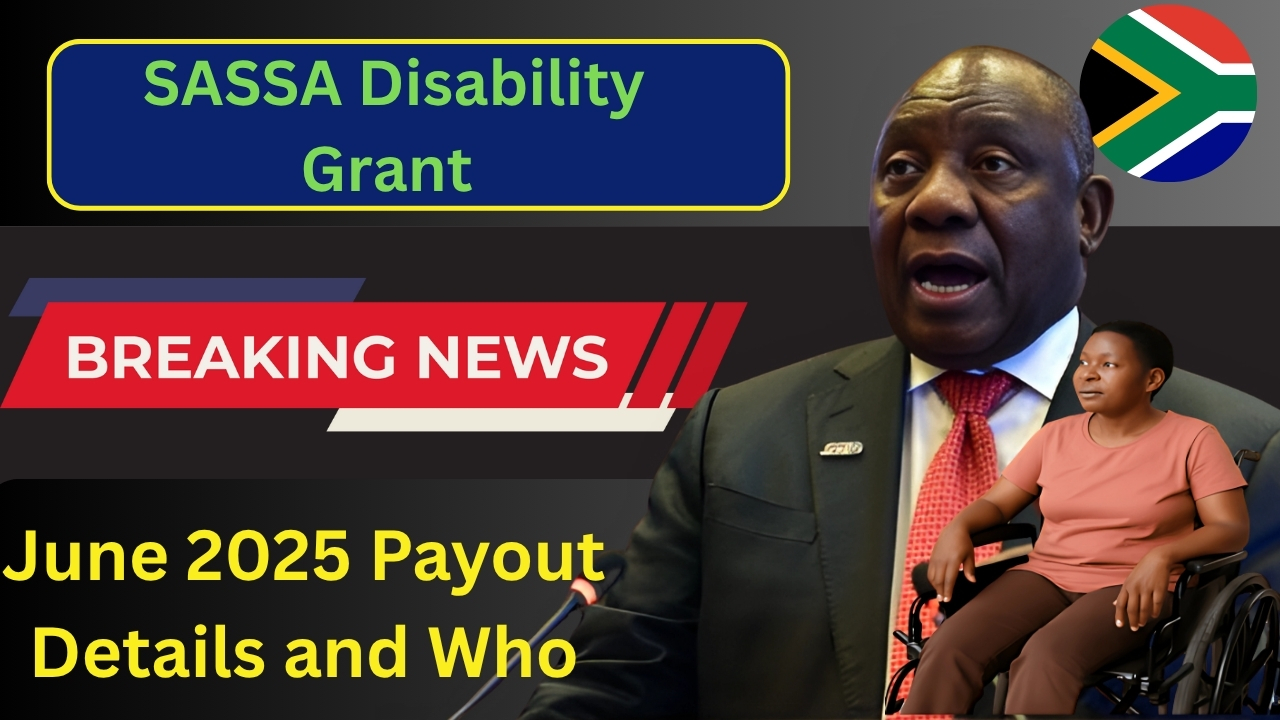SASSA Disability Grant: The South African Social Security Agency (SASSA) Disability Grant serves as a crucial financial lifeline for individuals whose disabilities prevent them from working and earning a sustainable income. Understanding the June 2025 payment schedule, eligibility requirements, and recent policy changes can help beneficiaries plan their finances effectively while ensuring they continue to meet program requirements.
This comprehensive guide walks you through everything you need to know about the SASSA Disability Grant for June 2025, from payment dates and amounts to qualification criteria and application processes. Whether you’re a current beneficiary or considering applying for the first time, this information will help you navigate the system successfully.
Payment Schedule and Amount for June 2025
Key Payment Date
For June 2025, SASSA will distribute Disability Grant payments on June 4, 2025. This follows the established pattern where disability grants are typically paid one day after the Older Persons Grant, helping to prevent system overload and long queues at payment points.
The payment system operates on a staggered schedule to ensure smooth distribution across South Africa’s extensive network of payment points. Over 19 million beneficiaries are expected to receive their grants by the end of the first week, with disability grant recipients forming a significant portion of this group.
Monthly Grant Amount
The maximum monthly amount for the Disability Grant is R2,310 per month. However, it’s important to understand that this amount operates on a sliding scale based on your income and assets. Individuals with lower private incomes receive higher grant amounts, while those with additional income sources may receive reduced payments or may not qualify at all.
The grant amount reflects the government’s commitment to providing meaningful support that can help cover essential living expenses including food, accommodation, healthcare, and basic necessities. This amount is subject to annual reviews and adjustments based on economic conditions and government budget allocations.
Who Qualifies for the SASSA Disability Grant
Age and Residency Requirements
To qualify for the SASSA Disability Grant, applicants must be between 18 and 59 years old and be a South African citizen, permanent resident, or recognized refugee living in South Africa. If you’re under 18 and have a disability, your primary caregiver may apply for a Care Dependency Grant instead. Similarly, individuals aged 60 and above should consider applying for the Older Persons Grant.
The residency requirement ensures that the grant reaches those who are permanently settled in South Africa and contributes to the country’s social stability. Refugees must have proper documentation proving their legal status in the country.
Medical and Disability Criteria
The core requirement centers on having a disability that significantly impacts your ability to work and earn income. You must be unfit to work due to mental or physical disability for more than six months. This includes a wide range of conditions, from physical impairments and chronic illnesses to mental health conditions and intellectual disabilities.
SASSA recognizes two types of disability grants based on duration. If your disability prevents you from working for six to twelve months, you may qualify for a temporary disability grant. If your disability is expected to last more than twelve months, you become eligible for a permanent disability grant. The term “permanent” doesn’t mean forever but rather indicates a longer-term need for support.
Financial Eligibility and Means Test
Single applicants must have an annual income not exceeding R86,280, while married applicants cannot have a combined annual income exceeding R172,560. This means test ensures that grants reach those who need them most while preventing abuse of the system.
The means test also considers your assets, including property, investments, and savings. You cannot receive another social grant for yourself while receiving the disability grant, though there are exceptions for certain supplementary grants like the Grant-in-Aid for those requiring full-time care.
Application Process and Required Documentation
Medical Assessment Requirements
Before applying, you must undergo a medical examination by a state-appointed doctor or submit a medical report from a qualified practitioner. The medical report must be issued within the last three months and must confirm your disability. This assessment determines whether your condition qualifies for temporary or permanent grant status.
The medical evaluation process is thorough and designed to ensure that grants reach individuals with genuine disabilities that prevent them from working. The examining doctor will assess both the nature and severity of your condition.
Essential Documents
You must bring your 13-digit bar-coded identity document, a medical report confirming your disability, and proof of marital status if applicable. If you don’t have an ID, you’ll need to complete an affidavit and provide proof of having applied for the document from the Department of Home Affairs.
Additional documentation may include proof of income, bank statements, and proof of residence. Having all documents properly prepared before visiting a SASSA office will expedite your application process.
Application Submission
Application forms are not available online and must be completed at your nearest SASSA office in the presence of a SASSA officer. This in-person requirement helps prevent fraud and ensures that applicants receive proper assistance during the application process.
If you’re unable to visit the office due to your disability, a trusted family member or friend can apply on your behalf with a letter from you and a doctor’s note explaining why you cannot visit personally.
Payment Methods and Collection Options
Convenient Payment Options
Grants can be accessed via SASSA cards, direct bank deposits, or collection at authorized retailers such as Pick n Pay, Boxer, Shoprite, Usave, and Checkers. This variety of options ensures that beneficiaries can access their funds in ways that suit their circumstances and mobility limitations.
Direct bank deposits offer convenience and security, allowing funds to be transferred directly to your personal bank account. The SASSA Gold Card functions like a regular bank card, enabling ATM withdrawals and point-of-sale transactions at participating retailers.
Safety and Security Tips
For safety, SASSA advises beneficiaries not to withdraw their entire grant at once. Instead, consider making smaller, more frequent withdrawals to reduce the risk of theft or loss. Always be aware of your surroundings when accessing your funds and avoid sharing your PIN or card details with anyone.
Recent Changes and Important Updates for 2025
Enhanced Verification and Compliance
SASSA has flagged more than 210,000 beneficiaries due to suspected “double-dipping” — receiving grants while earning undeclared income. These individuals must present themselves at their nearest SASSA office for a grant review within 30 days or risk having their grants suspended permanently.
This crackdown on fraud demonstrates SASSA’s commitment to ensuring that grants reach only those who truly qualify. Beneficiaries should always declare any changes in their income or circumstances to avoid complications.
No Additional Payments Expected
SASSA spokesperson Paseka Letsatsi emphasized that beneficiaries should not expect any double payment in June, stating that any increase not announced by credible authorities should be treated as false information. The next official grant increase is scheduled for October 2025, following the increase that took effect in April.
Managing Your Disability Grant Effectively
Understanding how to manage your grant effectively can help you make the most of this financial support. Consider setting aside funds for ongoing medical expenses, as healthcare costs can be substantial for individuals with disabilities. Creating a monthly budget that prioritizes essential expenses like food, accommodation, and medication will help ensure your grant covers your most important needs.
If your disability requires ongoing treatment or rehabilitation, factor these costs into your monthly planning. Some beneficiaries find it helpful to open a separate savings account to manage their grant funds and avoid the temptation to spend the entire amount immediately.
Frequently Asked Questions
1. What happens if I miss my payment collection date? Your grant remains available in your account even if you don’t collect it on the exact payment date. You can access your funds whenever convenient, which helps you avoid long queues on payment days.
2. Can I work part-time while receiving a disability grant? Yes, but your income must remain below the means test thresholds. Any earned income must be declared to SASSA to avoid being flagged for “double-dipping” and potential grant suspension.
3. How long does the application process take? The application process typically takes 6 to 12 weeks from submission to decision. Processing times may vary based on the complexity of your case and the need for additional medical assessments.

